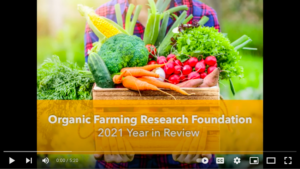President Biden Announces Largest Effort to Combat Climate Crisis in American History
On October 28, 2021, President Joe Biden announced the Build Back Better framework, which includes a historical push to address climate change and a $555 billion investment in a clean energy economy. The framework proposes a 50-52% reduction of greenhouse gas emissions in 2030, amounting to roughly over one gigaton. Funding for research and research facilities, including organic research, has been designated in the framework. Increasing resilience and natural solutions by investing in soil conservation is also specifically addressed in a White House statement.
”OFRF is very pleased that Congress and the White House acknowledge the climate-friendly benefits of organic agriculture,” said OFRF Senior Policy Associate Trevor Findley. “A number of conservation programs used by organic farmers and ranchers, such as the Environmental Quality Incentives Program and the Conservation Stewardship Program, are set to receive substantial increases in funding. These programs, combined with organic farming, will go a long way towards mitigating agriculture’s impact on the environment.”
Biden’s Build Back Better framework sets up the U.S. to meet its climate targets of reducing an estimated billion metric tons to meet below 2005 levels. According to a White House statement, the framework “represents the largest single investment in…history, across buildings, transportation, industry, electricity, agriculture, and climate-smart practices across land and waters.”
Of the $555 billion investment, more than $90 billion will go toward agriculture, nutrition, and forestry provisions. “With significant investments in resources for farmers, ranchers, and forestland owners, this bill provides a host of new tools to deploy important conservation practices and the research essential to inform them,” said Agriculture Secretary Tom Vilsack.
Agricultural climate research and ag facilities will receive a $2 billion investment. Half of that funding will go to research facilities for 1890 and 1994 Land-Grant and other Minority Serving Institutions (MSI). The remaining investment is designated for research and cooperative extension programs for farmers and rural communities, and to fund scholarship programs at 1890 and 1994 Land-Grant universities and other MSIs. Approximately $60 million will go to the Organic Agriculture Research & Extension Initiative (OREI), which OFRF has continued to advocate for throughout the reconciliation process. OFRF successfully advocated for the creation of OREI in the 2002 Farm Bill with then Iowa Senator Tom Harkin.
”Since the program’s inception, OREI has provided organic farmers and ranchers with vital research that has allowed them to farm in harmony with the environment,” said OFRF Executive Director Brise Tencer. “This additional funding for OREI acknowledges the climate-friendly benefits of organic agriculture and will continue to help organic farmers operate in a way that mitigates greenhouse gas emissions, sequesters carbon, and ensures resilience to a changing climate.”
An estimated $28 billion investment in climate-smart agriculture could affect approximately 130 million cropland acres per year or 240,000 farms. This funding would help producers implement conservation methods to build resilience and sequester carbon in soil and trees and expand practices such as cover cropping. Programs focused on whole-farm conservation systems and crop insurance will also be funded. “Producers who want to help sequester carbon or reduce greenhouse gas emissions will be able to carry out those practices with the funding provided in this bill,” said Congressman and Co-Chair and Founder of the Agriculture Research Caucus Jimmy Panetta (CA-20).
Debt relief for economically distressed farmers is also proposed in the Build Back Better framework. Approximately $6 billion will go to agricultural credit and outreach. This would include investments in USDA programming to support new and existing farmers through outreach, technical assistance, and education.
To learn more about the Build Back Better framework and information on additional clean energy initiatives and consumer rebates included in the bill, visit the White House website.



